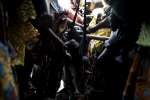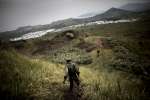- Text size
 |
|  |
|  |
| 
- Français
Assistant High Commissioner on mission to Great Lakes region
Briefing Notes, 29 January 2008
This is a summary of what was said by UNHCR spokesperson Ron Redmond – to whom quoted text may be attributed – at the press briefing, on 29 January 2008, at the Palais des Nations in Geneva.
The head of UNHCR's global operations, Assistant High Commissioner Judy Cheng-Hopkins, is in Tanzania today on a two-week mission to the Great Lakes region. This afternoon, Cheng-Hopkins is attending a send-off ceremony marking 50,000 returns from Tanzania to the neighbouring Democratic Republic of the Congo (DRC).
In total, since 2004, over 150,000 Congolese refugees have returned to the DRC, including some 60,000 in 2007 alone. In the DRC, the principal areas of return are South Kivu, Katanga and Equateur Provinces. Still, there are some 300,000 Congolese refugees in neighbouring countries. Tanzania hosts most of these people, with some 98,000 Congolese refugees accommodated in Lugufu and Nyarugusu camps in north-western part of the country.
Yesterday, Ms. Cheng-Hopkins met in Dar es Salaam with Tanzanian Prime Minister Edward Lowassa and other senior government officials. The discussions focused on the major UNHCR operations in Tanzania, namely the continuation of repatriation programmes for the remaining 98,000 Congolese and some 118,000 Burundian refugees living in five camps in north-western Tanzania. During 2007, UNHCR's operations in Tanzania helped find solutions for more than 71,000 refugees through repatriation, resettlement and naturalisation.
The discussions in Dar es Salaam also focused on concerted efforts to find comprehensive solutions for some 220,000 Burundian refugees who came to Tanzania in 1972 and live in three settlements in Tabora (Ulyankulu Settlement) and Rukwa regions (Katumba and Mishamo Settlements). This is one of the most protracted refugee situations on the African continent as well as globally. The tripartite agreement signed between Tanzania, Burundi and UNHCR late last year laid out foundations for voluntary repatriation and local integration of this specific group during 2008.
After her visit to Tanzania, the Assistant High Commissioner will proceed to Burundi, where she will visit reintegration programmes for returnees and meet with government officials and partners. Since the start of the repatriation operation to Burundi in March 2002, over 300,000 Burundian refugees have been assisted in repatriating from Tanzania to Burundi. In addition, some 76,000 refugees have returned spontaneously and also benefited from UNHCR's reconstruction and reintegration assistance in Burundi. Following Burundi, Ms. Cheng-Hopkins is scheduled to visit Nairobi and assess our programmes for tens of thousands displaced by the post-electoral violence in Kenya.






































